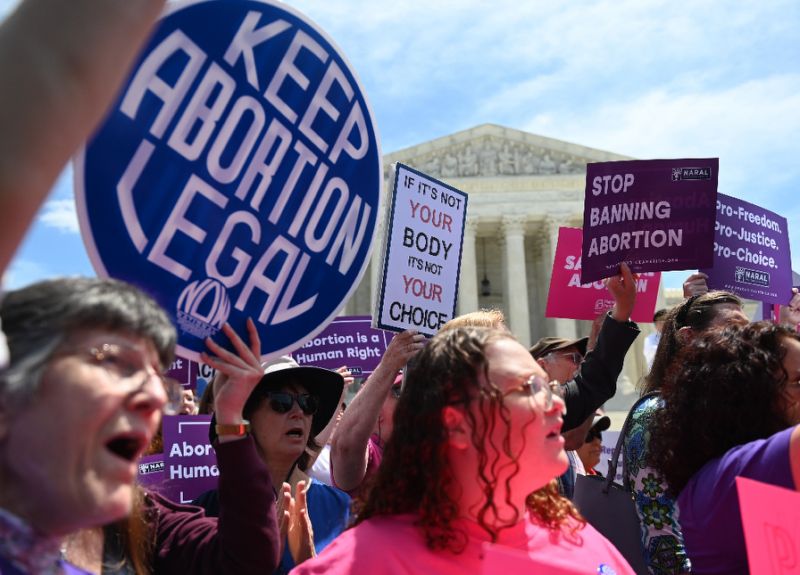There are 424 reasons why Alabama’s recent abortion ban shouldn’t be surprising. That is the number of anti-abortion laws passed in the United States since 2010. They passed with little public notice, except among reproductive rights activists and researchers like us. And then Alabama woke up America.
So, what do these laws look like?
Imagine you are a 17-year-old woman living in Pennsylvania. You have an unplanned pregnancy that you want to terminate. Law requires you to get parental consent. If you can’t get that consent, you must prove to a judge that you are mature enough to make this decision yourself via the judicial bypass system. If you live in one of the towns in Pennsylvania with no abortion providers (85 percent of Pennsylvanian counties have none), you might need to travel over 100 miles to reach a clinic. To enter the facility, you might have to run a gauntlet of anti-abortion protesters, whose right to display obscenely explicit pictures of bloody fetuses is protected by law.
Once inside, you are required to read materials produced by state bureaucrats about abortion risks and look at images and information about fetal development. In these materials, 50 percent of the information you receive about fetal development in the first trimester (when 90 percent of abortions take place) is medically inaccurate, according to our research.
You are then required to wait at least 24 hours before you can return to have your abortion. It costs at least $500, with costs rising the later you are in your pregnancy. No Federal funds can be used to pay for abortions; in Pennsylvania, no state funds can be used either, unless you are the victim of rape, incest or your life is endangered by the pregnancy. Otherwise, you must raise those funds yourself or with the assistance of a network of small, local, private abortion fundraising groups, largely run by volunteers. Only then can you have your abortion.
In an early pregnancy, you might be given one pill at the clinic and a second pill to take home in a “medication” abortion. However, if you are later in your first trimester, you will undergo a clinical abortion that typically takes five minutes and is safer than a tooth extraction. If you live in Indiana, an abortion also requires an ultrasound image of the embryo or fetus and the requirement to have the “products of conception” cremated or buried at your own additional expense.
The grim picture painted above is what access looked like for most abortion patients living in the United States before Alabama passed a law essentially banning abortion. In a perverse sense, the Alabama law – and the tremendous public response – has been a relief to those crying for attention to this issue.
The 424 restrictive abortion laws passed in the aftermath of Roe vs. Wade and the Supreme Court’s ongoing complacency over abortion restrictions have paved the way for this moment.
Arbitrary Rules and Medical Misinformation
Just as onerous as state laws restricting abortion are state health regulations. Just last week, the state of Missouri’s Health Department began requiring that patients receive an additional, medically unnecessary pelvic exam on their first visit to a clinic. This is in addition to the exam that is typically performed at the time of the procedure – a legally mandated 72 hours later.
Clinics are swamped by arbitrary, targeted rules imposed by state reporting systems, random inspections, and unreasonable regulations about staffing and building requirements. In some cases, these have forced clinics to shut their doors. In others, it has added tremendous burdens of time and expense to clinic services.
Four states require that abortion patients be read the sentence: “The abortion will terminate the life of a whole, separate, unique, living human being” and thirteen require a sentence asserting that the fetus experiences pain. Patients in many states must be informed that “your baby” has a brain, spinal cord, a heart, eyelashes, fingers, and toes. This is at a stage of development when a pregnancy is a literal ball of cells no bigger than the period at the end of this sentence.
Abortion bans aren’t just about controlling women’s bodies.
They’re about controlling women’s sexuality. Owning women.
From limiting birth control to banning comprehensive sex ed, US religious fundamentalists are working hard to outlaw sex that falls outside their theology.
— Alexandria Ocasio-Cortez (@AOC) May 16, 2019
In some states, patients must be told that there is an association between having an abortion and suicide or breast cancer. Peer-reviewed medical research shows that both claims are false.
In sum, courts permit state authorities to require doctors to commit medical malpractice in the provision of abortion services by conducting medically unnecessary invasive procedures and by giving patients medical misinformation.
Our Informed Consent Project is engaged in exposing the inaccuracies in abortion materials. We work with state departments of health and legal advocacy groups to remove medical misinformation and to remedy the constitutional rights violations uncovered by our research. We have had some success by flying under the political radar screen and working directly with public health staffers in both red and blue states (like Oklahoma and Michigan) who are responsible for distributing that information. But this patchwork approach is not enough.
Protecting Abortion Rights
What comes next? The Alabama law bans all abortions, except when the life of the pregnant woman is threatened. Five other states ban abortion at six weeks (Georgia, Kentucky, Louisiana, Mississippi, and Ohio); Missouri bans it at eight weeks. Arkansas and Utah ban abortions after 18 weeks. These regulations have all been at least temporarily stayed in the courts.
These laws and any others that ban abortion before the point of fetal viability (at approximately 24 weeks) are in violation of the standard the court set in Roe vs. Wade. A legal challenge to any one of them could put the constitutional question at the heart of Roe before the Court. Given how weakly the Court has protected this right and given the Court’s willingness to allow obstacles to exercise the right to abortion, it would be strategically unwise to rely on the Court for the protection of abortion rights.

We are heartened by the intensity of the response to these new bans and to the news that some states have recently implemented reproductive health protections. New York, Vermont, and Illinois all passed explicit legislative acts to protect the right to abortion; Kansas’ Supreme Court affirmed that the Kansas Constitution guarantees a patient’s autonomy in medical decision-making; and states such as New Mexico, West Virginia, Rhode Island, and Wisconsin have all made strides to overturn their unenforceable abortion bans.
State by state, the battles have been raging for many years. It has taken the passage of the most extreme measures since the 1973 Roe vs. Wade decision to finally put this issue front and center on the national political agenda.






















